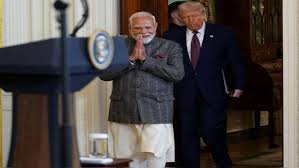US President Donald Trump, for first time, accepts two leaders of India-Pakistan ‘decided’ to stop conflict

In a rare diplomatic shift, U.S. President Donald Trump has admitted that the recent ceasefire between India and Pakistan came from their own decision-making. This is the first time he has stepped back from his earlier claims that the United States brokered peace between the two rivals. His statement marks a recognition of regional leadership and a correction in the narrative.
Earlier Claims of US Mediation
Weeks ago, President Trump had declared that Washington played a key role in halting conflict between India and Pakistan. He posted on social media that American diplomacy led to an “immediate ceasefire” after tense days along the Line of Control. This claim gained global attention, especially since both countries possess nuclear weapons.
However, India quickly challenged that version. The Ministry of External Affairs stated that the ceasefire emerged through direct communication between Indian and Pakistani military leaders. India emphasized that no third party was involved, sticking firmly to its policy of resolving issues bilaterally.
Modi’s Message Changes the Tone
According to multiple reports, Prime Minister Narendra Modi spoke with Trump following the U.S. announcement. During their call, Modi made it clear that India and Pakistan had made the decision on their own. General Asim Munir, Pakistan’s Army Chief, had also signaled that the talks were strictly between both nations.
Trump seems to have taken note. At a recent White House event, he said, “Prime Minister Modi and General Munir showed strong leadership. They made the call to pause the conflict. The United States supports that decision—but it was theirs.”
That single sentence shifted the credit from the U.S. to India and Pakistan. It also aligned with India’s long-held stance of rejecting foreign mediation, especially on matters concerning Kashmir.
Regional Leadership Takes Center Stage
Trump’s statement recognizes the political and military leadership of both countries. It shows that even powerful global leaders are beginning to accept that South Asian countries are capable of solving their own issues.
India’s policy of bilateralism dates back to the Simla Agreement of 1972. New Delhi has repeatedly rejected international involvement in its disputes with Islamabad. Trump’s new position supports that principle.
Pakistan, on the other hand, has historically welcomed global support on Kashmir. Yet, even its military preferred direct talks with India in this case. Economic challenges, domestic instability, and pressure from allies may have influenced that decision.
What Led to the Ceasefire?
Both countries had strong reasons to pause hostilities. India is preparing for national elections next year and is focusing on domestic growth. A prolonged conflict would distract from its development goals.
Pakistan’s economy is struggling with inflation and a debt crisis. Its leadership wants to avoid a full-scale conflict that could harm its already fragile stability. The military also needs to focus on internal threats from extremist groups and border security in the west.
With global attention shifting toward other hotspots like Ukraine, Gaza, and Taiwan, both nations wanted to project calm and avoid international criticism.
Media and Analyst Reactions
International media outlets have widely covered Trump’s change in tone. Many analysts believe this is a diplomatic win for India. Suhasini Iyer, a strategic affairs expert, said, “Modi’s clarity forced Trump to adjust his words. That’s strong diplomacy.”
On social media, Trump’s statement sparked debate. His supporters praised him for telling the truth. Critics called out his earlier exaggeration. In India and Pakistan, citizens seemed more focused on the ceasefire itself and its possible long-term benefits.
A Win for Bilateralism
For India, this moment confirms its belief that it can handle regional issues without help. For Pakistan, it proves that direct dialogue with India can still lead to results. Both sides have faced off in the past but continue to talk when the situation demands.
This event may set a new standard. Future peace talks or confidence-building measures might take place without American or international involvement.
Will the Ceasefire Last?
It’s hard to say. Past ceasefires between India and Pakistan have often failed. One border incident or political shift could undo the progress. But this time, the situation is different. Both nations are dealing with heavy domestic concerns, and neither wants war.
The acknowledgment from Trump may help calm future tensions. By stepping back, the U.S. has shown respect for regional decisions. That could pave the way for stronger, more stable relations in South Asia.






